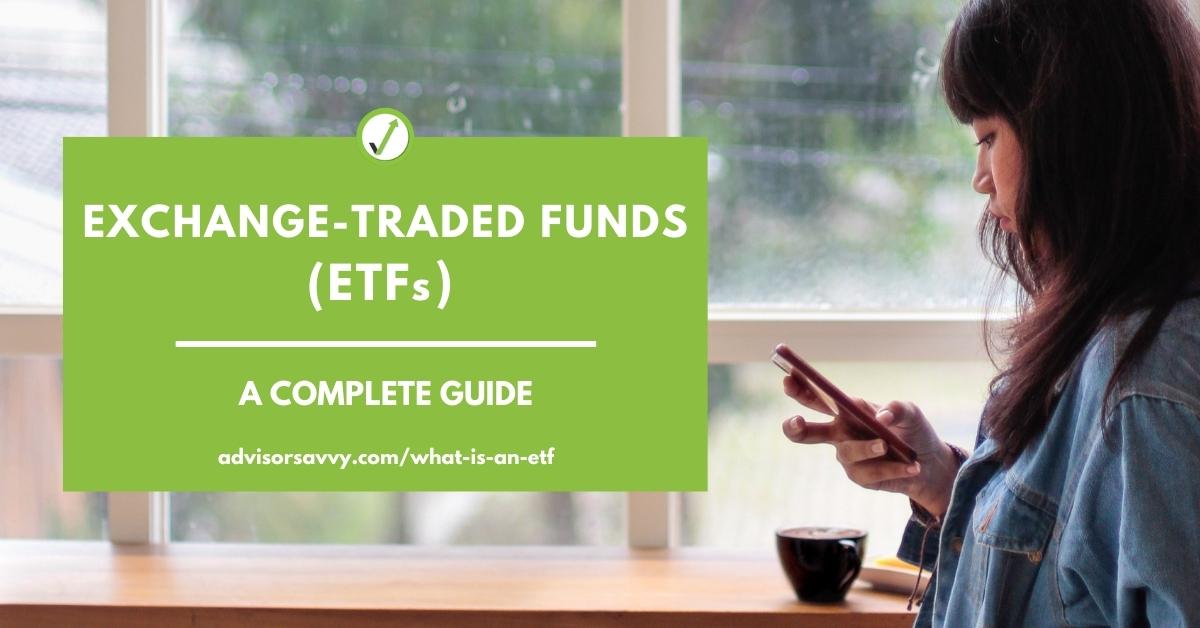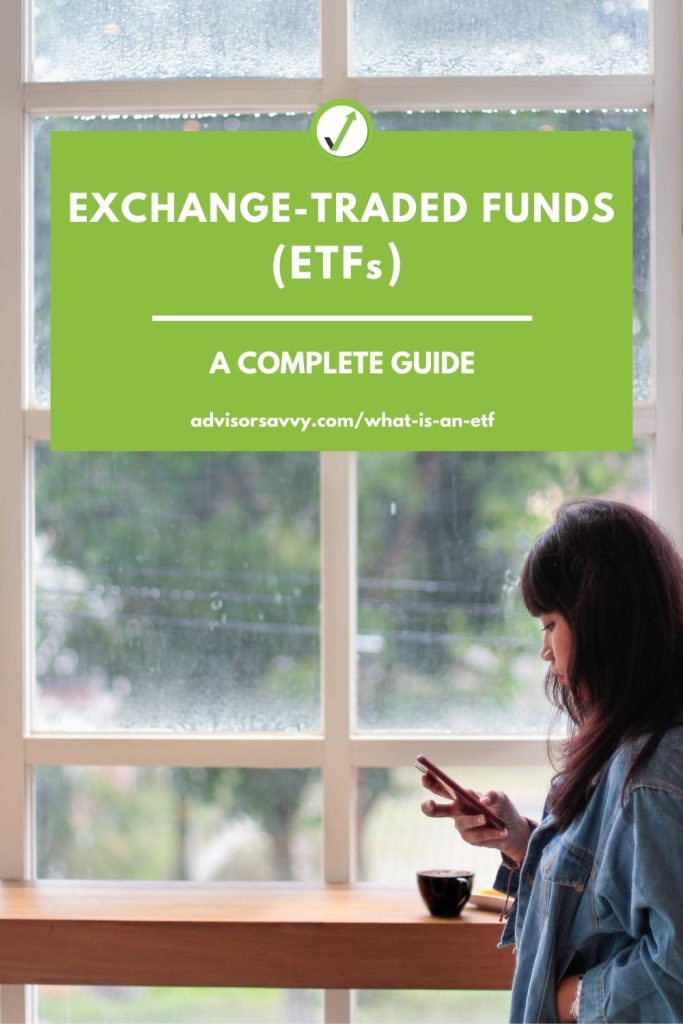
When deciding which investing vehicle makes the most sense for you, it’s best to understand all available options. But, ultimately, there is a lot to know. Learning the difference between a mutual fund and an exchange-traded fund (ETF), for example, can help you choose the best option today, and in the future. To help you decide, we’re answering your top questions, and sharing some of the best ETF picks in Canada.

Table of contents
- What are exchange-traded funds?
- Types of ETFs
- Are ETFs safe?
- How to Invest in ETFs
- ETF screener
- Best ETFs in Canada
- Takeaways
What are exchange-traded funds?
ETFs are similar to stocks. However, instead of investing in a particular company, they are essentially a basket of securities that trade together on the stock market. An ETF contains a mix of different types of investments, including bonds and commodities.
Exchange-traded funds are made up of established companies spread out across market sections — a key benefit of these funds. This diversification insulates you from market fluctuations. Their design makes them a good tool for investors wanting to enter a broad market. And while they are similar to mutual funds, you can buy them at a fraction of the cost. This is appealing to new or passive investors. That said, there’s likely an ETF out there for every level of investment expertise!
There are over 1,000 funds available to Canadian investors. It is challenging to wade through all of them, and to know where to invest your hard-earned money. That’s why both research and talking to a professional can help guide you toward ETFs that make the most sense for you and your financial goals. Ultimately, it comes down to three key points: your risk tolerance, your investment objectives, and your overall financial vision.
Fun fact: The world’s first ETF was introduced in Canada in 1990. It was iShares S&P/TSX 60 Index ETF (TSX:XIU), which is still actively trading today.
ETFs vs Mutual Funds
In Canada, mutual funds have always been a top seller. But exchange-traded funds are right on their tail. After all, there are many similarities between the two investment vehicles. In fact, some mutual funds even contain ETFs.
Most notably, mutual funds are actively managed, compared to the passive management of ETFs. While ETFs often track an index, mutual funds are typically more hands-on. To clarify, an advisor actively manages a mutual fund with the aim of earning investors higher earnings.
Both investment vehicles have a Management Expense Ratio (MER), which is the sum of all operating expenses, expressed as a percentage. As such, mutual funds have a higher MER since they are actively managed. Because ETFs are passively managed, the MER is much lower in comparison.
In addition, mutual funds come with a higher barrier to entry. On the other hand, ETFs are low-cost, and just about anyone can get started with investing in them. Finally, unlike ETFs that fluctuate with the market throughout the day, mutual funds are only traded once a day, after the markets close.
Related Reading: ETFs vs Mutual Funds: Which is Better?
ETFs vs Index Funds
These three are more similar than you think. In fact, certain ETFs and mutual funds are just types of index funds, designed to match or track a specific market index.
Which should I choose?
Your risk tolerance — in step with your investment horizon and financial goals — determines which investment option makes the most sense for you.
For the laid-back investor looking for less management and lower expenses, an ETF may be the better option. However, if you want to invest in more niche market segments, a mutual fund is more likely to get you there. Both provide a good option for investing your money in multiple sectors, industries, and stocks compared to buying individual stocks. This makes both a good investment and a diversified, well-rounded portfolio.
Related Reading: Cash ETF Canada
Types of ETFs
ETFs are like baskets of stocks and there is a large number to choose from. As mentioned above, most funds are designed to track a specific index, trying to replicate it. Here are some of the most common types of ETFs you’ll see, as outlined by Blackrock:
| Type of ETF | About |
|---|---|
| Equity ETFs | Track an index of equities. You can also target specific sectors like tech or financial stocks. |
| Bond/Fixed- Income ETFs | Like stock funds, they are a diverse selection of investments. Instead of stocks, they hold fixed-income securities. |
| Commodity ETFs | An entryway into commodities like gold, silver, or oil. For example, a gold ETF. |
| Currency ETFs | Invest in either one currency or a basket of currencies. One newer example is the emergence of cryptocurrency ETFs and money market ETFs. |
| Specialty ETFs | Under this umbrella are two fund types — leveraged funds (borrow money to invest), and inverse funds (go up when the target index goes down). |
| Factor ETFs | Follow a specified market or index across asset classes. As Vanguard explains, they purposely “tilt portfolios toward certain stock characteristics like recent momentum, higher quality, or lower stock prices to achieve specific risk and return objectives.” |
| Sustainable ETFs | Follows ESG principles while still investing in the traditional way. These are increasingly popular. |
Related Reading: Types of ETFs in Canada
Are ETFs safe?
Investing in an exchange-traded fund is equivalent to investing in a bucket of stocks that live on the stock market. If the stock market tanks, so too will your ETF, unfortunately. Ideally, you diversify your holdings so that a significant market hit doesn’t empty your bank account. However, if you don’t invest with foresight, as well as diversity and risk assessment, you may lose all of your money.
How to Invest in ETFs
To purchase a fund, you can go directly to the source and purchase it directly from the issuer. The top providers in Canada are iShares, BMO, Horizons, and Vanguard.
You also have the option of working with a broker who will look at multiple issuers for you to purchase from. Alternatively, you can use a robo-advisor like Questrade, Wealthsimple, or QTrade to purchase and manage your investments.
Related Reading: BMO ETFs vs Vanguard ETFs
ETF screener
Have a fund in mind? The best way to decide if it’s a good investment, and to get an overall view of its performance, is to use an ETF screener. This tool helps you compare and review the current and average performance of different funds. You can filter and narrow down your options based on the criteria of interest.
Related Reading: Are ETFs more tax efficient than mutual funds in Canada?
Best ETFs in Canada
As mentioned, there are over 1,000 funds available for Canadian investors. It’s important to do your research, or work with a professional, to make sure you choose the right ETFs for you and your financial situation and goals. That said, here are three of the top funds in Canada for you to invest your money.
NOTE: All numbers below are accurate as of January 2024.
Vanguard FTSE Canada All Cap Index ETF (TSX:VCN.TO)
This fund is diversified across small, medium, and large-sized stocks, and looks to track the FTSE All Cap Index. We like it because of its very low MER — just 0.05%, with a 12-month yield of 3.01%. Currently, its top holdings are RBC, TD Bank, Shopify, Enbridge and Canadian Natural Resources, so it’s quite concentrated on the financial and energy sectors. That said, there is still allocation to sectors like materials, technology, utilities, and more.
iShares Composite High Dividend Index ETF (TSX:XIC.TO)
XIC lets you own a portion of the entire Canadian stock market. How does that sound? This fund, designed as a long-term core holding, tracks 226 large-, mid-, and small-cap stocks. It shares the same top 10 holdings as TSX:XIU (iShares S&P/TSX 60 Index ETF) — the first ETF in the world — but has more small-and mid-cap stocks. With net assets of $10B, XIC has a MER of 0.06% and a distribution yield of 2.96%.
BMO Capped Composite Index ETF (TSX:ZCN.TO)
ZCN is designed to replicate the performance of the S&P/TSX Capped Composite Index, net of expenses. The fund includes over 200 top Canadian stocks, representing over 95% of the Canadian equity market. It’s designed for investors looking for growth, and the diversification of holding 95% of the equity market is pretty great! ZCN has net assets of $7.35B, a MER of 0.06%, and a yield of 3.29%.
Related Reading: 7 Best High Yield ETFs in Canada
What is the best dividend ETF in Canada?
Most ETFs will pay dividends quarterly, though there are some that pay monthly dividends. If you’re interested in the passive income that comes with dividend ETFs, the following are great picks:
BMO Canadian Dividend ETF (TSX:ZDV.TO)
Net assets: $1B
MER: 0.39%
Dividend yield: 5.48%
iShares Composite High Dividend Index ETF (TSX:XEI.TO)
Net assets: $1.57B
MER: 0.22%
Dividend yield: 5.41%
iShares Canadian Dividend Aristocrats Index Fund (TSX:CDZ.TO)
Net assets: $927M
MER: 0.66%
Dividend yield: 4.08%
Related Reading: MER vs Management Fee: What’s the Difference?
Best all-in-one ETF in Canada
For this type of ETF — launched in 2018 by Vanguard — it’s all in the name. They are essentially a “fund of funds,” all pooled together in one basket. Bonus? They automatically rebalance (and are also known as asset allocation ETFs), and are therefore a simple way of getting that all-important diversification. All-in-ones are priced quite low, making them accessible for newer investors.
One of the best, and most popular, asset allocation ETFs? Vanguard Growth ETF Portfolio (TSX: VGRO.TO). With a stocks/bonds mix of 80%/20%, VRGO seeks to provide long-term capital growth. It does this by investing in equity and fixed-income securities. The fund has $4.54B in assets under management, a MER of 0.24%, and a 12-month yield of 2.16%.
Related Reading: The Best All in One ETF Investments
Takeaways
ETFs are a great and accessible investment option for all types of investors. Whether your goal is slow, reliable growth, or a riskier portfolio with the chance to earn more money quickly, there is a fund that will suit your investment style and needs.
Read More: Best Dividend ETFs in Canada
